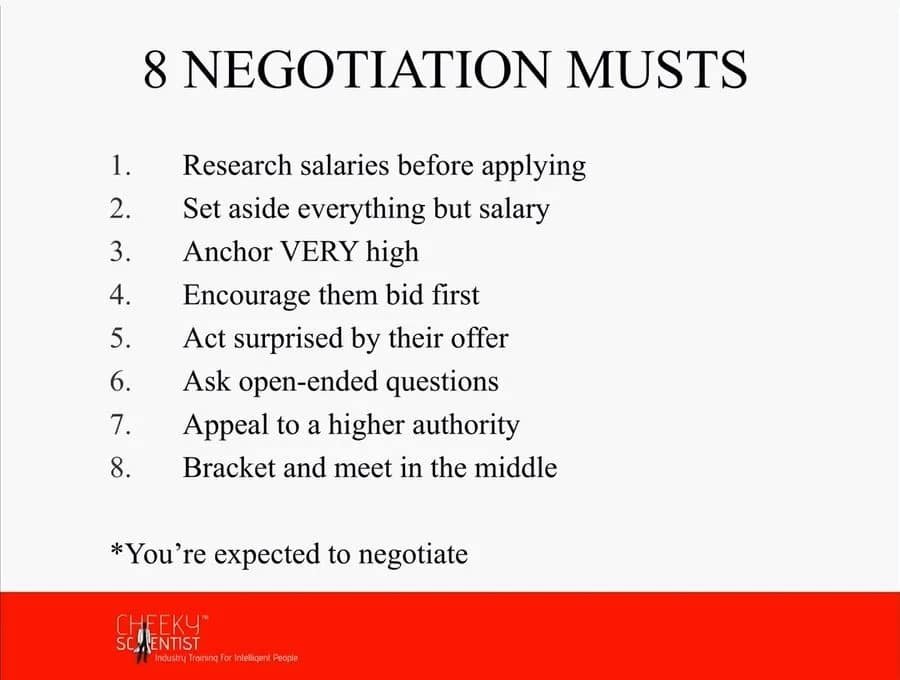Your Salary Today Shapes Your Success Tomorrow
Your first salary would influence your earning trajectory throughout your entire career.
For this reason, you should always negotiate salary and try to improve your offers.
And salary or pay raise negotiation is never about being greedy or super-aggressive.
The salary or pay raise negotiation principles we discuss below apply to your first job.
The principles also apply to all offer negotiations at work.
Negotiation should be a win-win: the employer and the employee are happy too.
First and foremost, you must understand that salary negotiation happens much earlier than the job offer.
For example, when uploading your CV to job boards, advertisers ask for your salary expectations. [Meanwhile, if you want to know how to write a resume like a pro, here’s our must-read article.]
They do this to weed you out if you’re not in their salary range or the price you are low by ‘forcing’ you to make the first offer.
For international candidates, checking out salary.com or Glassdoor.co.uk is a good practice.
These sites can help you understand the reasonable salary range.
Always refrain from making the first offer.
The first person making an offer often fares poorly in the negotiation.
The fastest way you’ll ever make money from salaries is during negotiations.
It affects, sets, or establishes your future salary trajectory, too.
This is because new employers often call your previous employer and ask for your previous “start & end dates,” “starting & ending salaries,” and “starting & ending job titles.”
They can then use these to pay you less by giving you the job title closest to your last job title/salary.
Therefore, the higher your last job’s salary, the higher you’ll fare in your entire career salary trajectory.
New employers don’t see you earning, say £3K per month, and they then offer you £ 5 K.
Instead, they’ll offer £3.5K or less if you don’t know the cardinal rules.
3 Cardinal Rules For How To Negotiate a Salary Offer

Cheeky Scientist, which trains and supports PhDs in their job search journeys to land new roles in non-academic fields, offers eight salary negotiation must-know tips as follows:

Suppose the employer makes any oral offer during the interview (hurrah! However, always insist on a written offer.
In particular, Item 7 asks to take the offer home to speak with ‘someone’ (e.g., your spouse) before reverting to them.
This tactic would enable you to return and ask for a little more based on your post-consultation with your ‘higher authority’.
Nine times out of ten, this would work like magic.
You can follow the above advice after receiving your offer letter and before you accept the offer.

7 Tips To Negotiate Salary Offers At Work
1. Take the time to research and understand what a fair salary for your position is
Enter salary negotiations with the most current and accurate information possible.
To determine a comparable salary for your position, consult salary guides for the relevant sector and job title.
You may discover more detailed advice and negotiating points for that sector, such as current skills shortages, that can help you build your case.
High-demand jobs or critical jobs are where you should be looking to find any new job opportunity.
These positions pay better than others and require more skills and experience.
These factors mean that your starting salary will have room for negotiation.
According to McKinsey Consulting, various employment sectors are at risk following the COVID-19 pandemic.
Avoid targeting positions that may be in the at-risk category post-COVID-19. It will weaken any potential salary negotiation.
2. Salary negotiation can be challenging
Be prepared to negotiate your case by researching the job and company beforehand.
Highlight your qualifications and demonstrate how you will benefit them as a candidate for the position.
Also, explain why they should offer you more than any other job applicant.
When you receive an offer, counter with a higher amount if you know your skills are worth more.
Therefore, research is critical.
Turn the negotiation into a chance to highlight your strengths, let them know why hiring you will benefit the company.
Avoid just focusing on the salary you want.
Before negotiating, study the job description and company website to determine the skills the position requires.
Remember your best points and tie them in with this information.
3. Be honest
Being honest is the best policy when negotiating salary, including disclosing your true intentions.
Consider your career trajectory and the time you expect to spend at the firm.
Are you a high-value candidate?
Does this new opportunity fit your long-term plans?
Like this post?
Sign up for our blog updates and never miss a post.
We’ll send you A FREE job interview eBook as a thank-you.
4. When negotiating salary, don’t overlook the benefits
Negotiating salary often involves some compromise and flexibility.
Let’s say, for example, you’re negotiating a more flexible work schedule in exchange for a lower salary.
The employer may be willing to allow extra time off or leave.
Working from home options are also easier for a recruiter or company to concede than giving up extra pay directly.
Determine what’s valuable to you and the company.
It may be enticing if they offer more money than you currently ask.
You should also consider health insurance, retirement contributions, or professional development.
A good benefits package can significantly boost the value of a salary package.
Are specific perks, like on-site childcare, valuable when deciding where to work?
Consider the entire package in the negotiation.
That way, you can be sure of your desired outcome.
5. Plan, don’t improvise
Ask for help! Practicing the negotiation conversation you will likely have with your potential employer in the interview with a friend or mentor is useful.
Your best coach would be someone who has experience in interview negotiations.
Their advice and knowledge could help you feel more confident about what you want when negotiating salary.
6. Know when to stop
This is one of the most overlooked tips. If the company makes you a fair offer, the employer may withdraw it if you try to negotiate further.
Be aware of when you should stop asking for things you want and accept the offer made.
Prolonging the negotiation process by continually asking for more can frustrate them and compromise your new working relationship.
Try to feel when the pay negotiation process has reached an end.
However, don’t be a walkover.
If, after a few discussions, they still don’t meet the salary requirements you asked for, gracefully call an end to the discussion.
Focus on other hiring situations and another employer that can better match your compensation expectations.
7. Get the pay offer in writing
Remember, negotiating your salary is a delicate and essential process.
So take your time and develop a reasonable approach to discussing pay and other details.
Consider the other employment details to create an appropriate job offer.
After agreeing to the employer’s pay offer, request a written document detailing the salary and other terms discussed.
For example, does the offer include a new signing bonus or allowance for moving expenses?
Ensure that the contract includes job duties and title details, then review it carefully before signing your name. Avoid email agreements.
Salary Negotiation Is Not Just About You
In salary negotiation, keep a positive tone while discussing salary and bonuses, as this will likely benefit you most in the long term.
If you want a better job offer, you must negotiate for it.
One of the biggest mistakes job seekers make in their careers is accepting the first job offer without negotiating the salary.
Employers and hiring managers are always looking to hire people with specialisations, in-demand skills, and experience.
Researching the company, tactical thinking, and confidence are the keys to successfully asking for the salary you deserve.
Developing the necessary skills to negotiate successfully will be valuable throughout your career.



